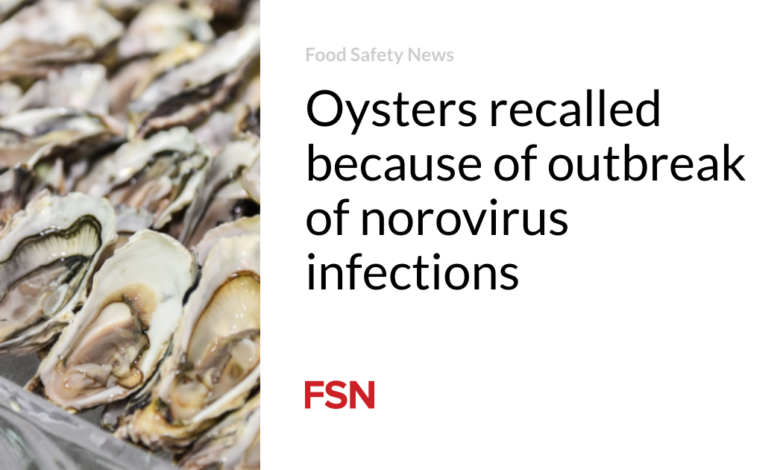Oysters recalled because of outbreak of norovirus infections


Taylor Shellfish Canada ULC has issued a recall for certain oysters harvested from British Columbia, Canada, and distributed in the United States because of norovirus contamination.
The recall was triggered by the Canadian food Inspection Agency’s investigation into a foodborne illness outbreak. Between Nov. 1 and Dec. 20, there were 77 cases of norovirus-like gastrointestinal illness reported in the Vancouver Coastal Health, Fraser Health and Island Health regions.
The oysters were sold as Fanny Bay, Sunseeker, and Cloudy Bay oysters from lots # 39021 and # 39033 that were originally harvested from British Columbia, Canada, growing area BC 14-8 LF# 0278741 on Nov. 27 and Dec. 3 and lots # 39036 and # 39043 that were originally harvested from growing area BC 14-8 LF # 0335309 on Dec. 3 and Dec. 5. The oysters have processing dates reaching to Dec. 13.
The oysters were shipped to distributors and retailers in Alberta, British Columbia and Ontario, Canada, and in California in the U.S. They may have been distributed to other states as well. The U.S. Food and Drug Administration is advising restaurants and food retailers not to serve or sell and to dispose of, and consumers not to eat, these oysters following the instruction provided below because they may be contaminated with norovirus.
Oysters contaminated with norovirus can cause illness if eaten, and potentially severe illness in people with compromised immune systems. Food containing norovirus may look, smell, and taste normal. Consumers of these products who are experiencing symptoms of illness should contact their healthcare provider and report their symptoms to their local Health Department. Diarrhea, abdominal cramps, nausea, vomiting, and fever may be associated with gastroenteritis infections caused by this organism.
Restaurants and retailers should not serve or sell these potentially contaminated oysters. Restaurants and retailers should dispose of any of these products by throwing them in the garbage or returning them to their distributor for destruction.
Restaurants and retailers should also be aware that shellfish may be a source of pathogens and should control the potential for cross-contamination of food processing equipment and the food processing environment. Employees should follow these steps:
- Wash hands with warm water and soap following the cleaning and sanitation process.
- Retailers, restaurants, and other food service operators who have processed and packaged any potentially contaminated products need to be concerned about cross-contamination of cutting surfaces and utensils through contact with the potentially contaminated products.
- Retailers that have sold bulk product should clean and sanitize the containers used to hold the product.
- Regular frequent cleaning and sanitizing of food contact surfaces and utensils used in food preparation may help to minimize the likelihood of cross-contamination.
(To sign up for a free subscription to Food Safety News,click here)



